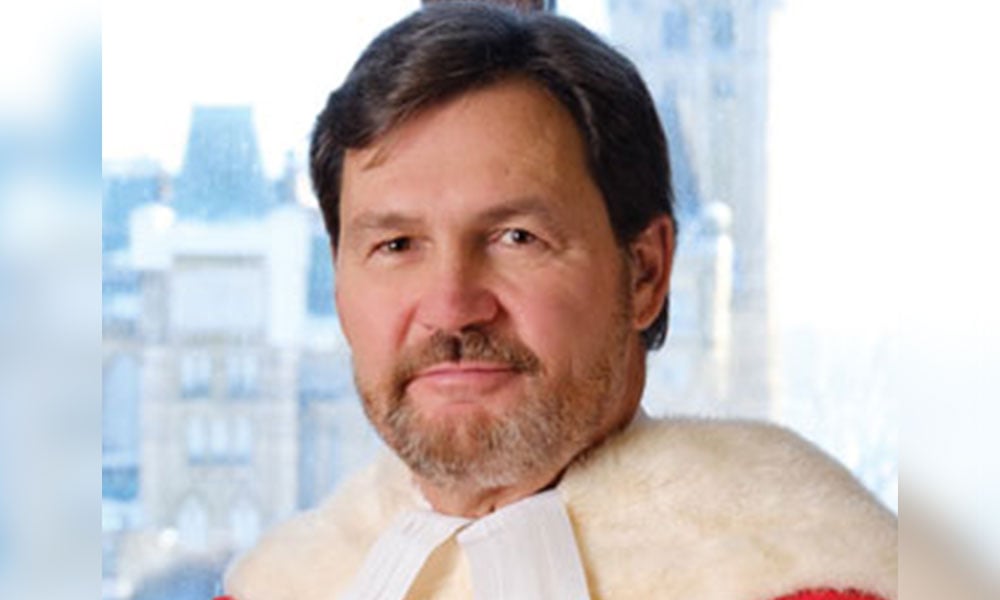
One panel discussed how judiciary and media roles intersect in public education of legal issues

Chief Justice of Canada Richard Wagner noted the dwindling number of journalists covering the courts in Canada during a recent Canadian Bar Association forum on the roles of journalists and the judiciary in preserving public trust in the justice system.
In his keynote address, Wagner said that misinformation has eroded confidence in democratic institutions by promoting political cynicism, distorting public debate, and reinforcing polarization. At the same time, a strong democracy relies on citizens having access to “diverse and reliable sources of information, so that they may form opinions, participate in public debates in a productive way, and hold governments and individuals to account,” he said.
“Earlier this year, I attended a conference of judges and court communication officers from every province and territory gathered together in a room,” he said. “They were asked if they had observed fewer journalists covering their courts. Everyone raised their hands, including representatives from the Supreme Court of Canada.”
The SCC organizes press briefings for the release of its decisions. Wagner said that on rulings with significant public interest, its briefing room once overflowed with reporters. But now, very few regularly attend, and an employee in his chambers has the job of calling producers and journalists across Canada to encourage them to watch hearings and cover decisions. He adds that while this has proven to be an effective tactic, most courts in Canada do not have the resources to implement it.
Wagner added that the decline in engagement is not the fault of the journalists, who are contending with fewer reporters and fewer resources and must “feed the 24-hour news machine on multiple media platforms.” But he said the relationship between the two institutions is an important bulwark against forces that seek to diminish the trust on which the rule of law relies.
“Open, independent, and accessible courts build public trust and confidence,” he said. “When people trust national institutions, they are more resilient to misinformation and less likely to share it with others.”
“I think we would agree that among the most serious harms of misinformation is that it leads people who are otherwise of good faith to lose confidence in their institutions and pervert the principles that uphold our democracy.”
The CBA’s forum, “Courting Confidence: Preserving Trust in Judicial Independence,” took place Wednesday at the Fairmont Château Laurier in Ottawa. Two panels followed Wagner’s keynote address and remarks from Shalene Curtis-Micallef, deputy minister of justice and deputy attorney general of Canada.
In his opening remarks, CBA president and McCarthy Tétrault partner Steeves Bujold said that Canada has long been viewed as a “beacon of fairness and justice,” but declining institutional trust and constraints posed by limited resources demand the legal profession’s attention.
“Escalating attacks on our institutions, including the judiciary, and the rise in security threats against judges, lawyers, and journalists are all worrisome,” he said. “Undoubtedly, you are also concerned about the chronic underfunding of our courts, resulting in delays and backlogs that obviously hinder the efficient administration of justice, whether it’s in Montreal, Toronto, Calgary or Vancouver.”
While constitutional protections, legislative frameworks, and judicial codes of conduct help maintain the judiciary’s independence and integrity, a lack of access to justice, delays, and tight judicial budgets have undermined public confidence in the courts, said Bujold. The profession cannot let “apathy, disillusionment, or attacks on judicial independence” threaten democracy, but he said it can do more to earn trust.
“My hope today is that we can seize the opportunity to come together, share knowledge, exchange ideas, and begin devising solutions – solutions that will reinforce, and dare I say, restore the public's trust in the legal system as a reliable avenue for resolving disputes and legal problems.”
The first panel, “Crisis of Confidence: The Role of Media & An Informed Public in Upholding Democratic Institutions,” included Glenn Joyal, Chief Justice of Court of the King’s Bench Manitoba; Patrick Bourbeau, VP of Legal Affairs at La Presse and president of the Canadian Media Lawyers’ Association; and Althia Raj, a columnist at the Toronto Star. They discussed how courts and journalists navigate their respective roles and educate the public on critical legal issues while counteracting misinformation.
The second panel, “Strengthening Judicial Independence,” featured Michael Tulloch, Chief Justice of Ontario; Marie-Anne Paquette Chief Justice of the Quebec Superior Court; Federal Court Justice Paul Favel; and Michèle Monast, president of the Canadian Superior Court Judges Association. The panel’s focus was on how to preserve and strengthen judicial independence in the face of the threats posed by polarization and underfunded justice.